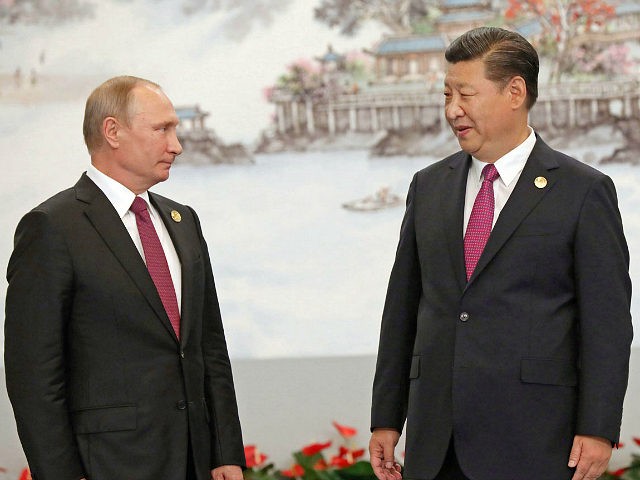European leaders talked a great deal about keeping the Iran nuclear deal alive after President Donald Trump announced U.S. withdrawal three weeks ago, but the news turned with remarkable speed to European business interests pulling out of Iranian deals on the eve of American sanctions taking effect.
The Wall Street Journal worried on Monday that Russia and China will step forward to profit from Europe’s departure.
As the WSJ tells it, Russia has been a cautious investor so far, primarily selling oil drilling equipment to Iranian companies. China is making a much bigger play for Iran’s business:
China Petroleum & Chemical Corp. , or Sinopec, a giant Chinese-state oil company, sent a delegation to Tehran this month to complete a $3 billion deal to further develop a giant Iranian oil field that Royal Dutch Shell PLC was negotiating for until it decided in March the sanctions risk was too great, say Iranian and Western oil executives. That deal, to develop the Yadavaran oil field, would be potentially the biggest foreign investment in a decade.
China National Petroleum Corp., another state-owned giant, has an option for the $1 billion investment pledged by Total for a natural-gas development in Iran that the French company is considering leaving because of U.S. sanctions, CNPC and Iran officials say. CNPC is Total’s partner in the project.
Chinese companies have also joined with Iranian peers to renovate railways, build metro lines and manufacture cars. Cheap clothing, cookware, consumer electronics and sunflower seeds imported from China have become popular in Tehran’s street markets.
Secretary of State Mike Pompeo responded to the news by predicting that Russia and China will only go so far to empower Iran, because they see Tehran’s malevolent influence in the Middle East as a “threat” to their interests as well. The Russians, in fact, are already leery of doing business with the Islamic Revolutionary Guard Corps.
Other U.S. officials quoted by the WSJ speculated that not even China and Russia can afford to ignore the pressure Washington will employ to economically isolate Tehran.
Another Wall Street Journal report on Tuesday noted that global shipping companies are beginning to pull out of Iran, including Maersk and Mediterranean Shipping, and relocating their ships to other oil-producing countries. That includes Chinese shipowners, who expressed concerns about the massive losses they would incur if defying U.S. sanctions left them unable to do business in the United States.
“I don’t think any shipping line that operates globally will be able to do business in Iran if the sanctions arrive in full force, the way they are intended,” predicted Maersk chief executive Soren Skou.
EU Observer noted on Tuesday that fiery rhetoric about keeping the Iran nuclear deal alive without America has given way to subdued realism that America is more important to Europe than Iran. Some Europeans fear continuing to do business with the terror masters of Tehran could trigger a disastrous exchange of sanctions between the United States and EU. Others worry that disagreements on the subject between EU member states could tear the European Union apart long before the first exchange of fines across the Atlantic.
On the other hand, the Iranians are still floating plausible rumors that certain European nations are conspiring with them to evade U.S. sanctions, as is India, which appears to be playing a double game of cozying up to Iran while pushing for improved U.S. relations. There is grumbling on Capitol Hill that India is also helping Russia to evade the latest round of American sanctions.

COMMENTS
Please let us know if you're having issues with commenting.